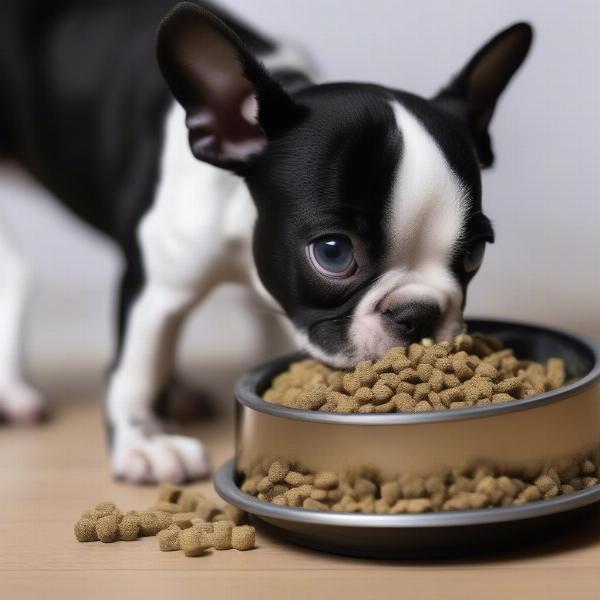Choosing the right boston terrier dog food is crucial for your furry friend’s health and happiness. This guide covers everything you need to know about feeding your Boston Terrier, from puppyhood to senior years, ensuring they get the proper nutrition for a long and active life. We’ll discuss the specific dietary needs of this breed, explore different types of dog food, and offer tips on selecting the best option for your Boston Terrier.
Understanding Your Boston Terrier’s Nutritional Needs
Boston Terriers are a small breed with specific dietary requirements. Like all dogs, they need a balanced diet that provides adequate protein, fats, carbohydrates, vitamins, and minerals. However, factors like age, activity level, and underlying health conditions can influence their nutritional needs. For instance, puppies require more calories and protein for growth, while senior dogs may benefit from a lower-calorie diet with added joint support ingredients.
 Boston Terrier puppy eating from a bowl
Boston Terrier puppy eating from a bowl
Types of Boston Terrier Dog Food
Several types of dog food are available, each with its pros and cons. Dry kibble is a popular choice due to its affordability and convenience. Wet food is often more palatable and can be beneficial for picky eaters or dogs with dental issues. Raw and homemade diets are also options, but they require careful planning and preparation to ensure nutritional balance.
Dry Kibble
Dry kibble is a cost-effective and convenient option for Boston Terrier owners. It has a longer shelf life than wet food and helps clean your dog’s teeth. Choose a high-quality kibble formulated for small breeds with a moderate protein and fat content.
Wet Food
Wet food is often more appealing to Boston Terriers, especially picky eaters. Its higher moisture content can also be beneficial for dogs prone to urinary tract infections. However, wet food is more expensive than kibble and spoils faster.
Raw and Homemade Diets
Raw and homemade diets are gaining popularity, but they require careful planning and preparation. Consult with a veterinary nutritionist to ensure your Boston Terrier’s nutritional needs are met. These diets can be beneficial for dogs with food allergies or sensitivities, but they can also pose a risk of nutritional deficiencies or bacterial contamination if not formulated correctly.
Choosing the Best Boston Terrier Dog Food
When choosing boston terrier dog food, consider factors such as your dog’s age, activity level, and any health conditions. Look for a high-quality food that meets the AAFCO (Association of American Feed Control Officials) standards. The ingredient list should list real meat or poultry as the primary ingredient, and avoid fillers like corn, wheat, and soy.
What Should I Feed My Senior Boston Terrier?
As Boston Terriers age, their nutritional needs change. Senior dogs often benefit from a lower-calorie diet with added joint support ingredients like glucosamine and chondroitin. best dog food for boston terrier offers more information on choosing food tailored for senior dogs.
What if My Boston Terrier Has Food Allergies?
Food allergies are relatively common in Boston Terriers. If your dog shows signs of food allergies, such as itching, skin irritation, or gastrointestinal problems, talk to your veterinarian. They may recommend a hypoallergenic diet or an elimination diet to identify the offending ingredient. best dog food for boston terriers can help you find the right food for your allergic Boston Terrier.
Conclusion
Choosing the right boston terrier dog food is essential for your dog’s overall health and well-being. By understanding their nutritional needs and carefully considering the available options, you can ensure your Boston Terrier enjoys a long, healthy, and happy life. dog foo can provide additional resources on dog nutrition.
FAQ
-
What is the best dry food for Boston Terriers? The best dry food depends on your dog’s individual needs, but look for a high-quality kibble with real meat as the first ingredient.
-
Can Boston Terriers eat grain-free food? While some Boston Terriers can thrive on grain-free diets, it’s essential to consult with your vet before making the switch.
-
How much should I feed my Boston Terrier puppy? Follow the feeding guidelines on the puppy food label and consult with your veterinarian.
-
What are signs of food allergies in Boston Terriers? Common signs include itching, skin irritation, vomiting, diarrhea, and ear infections.
-
Are homemade diets safe for Boston Terriers? Homemade diets can be safe if carefully planned with a veterinary nutritionist to ensure nutritional balance.
-
What human foods can Boston Terriers eat? Some safe human foods for Boston Terriers include cooked chicken, carrots, and apples. However, always check with your vet before giving your dog any new food. bugg dog for sale and good dogs for men offer information on various dog-related topics, including healthy treats.
-
How can I transition my Boston Terrier to a new food? Gradually mix the new food with the old food over 7-10 days to avoid digestive upset.
ILM Dog is your trusted resource for all things canine. We provide expert advice on breed selection, health care, training, nutrition, grooming, and more. From puppyhood to senior care, we’re here to help you provide the best possible care for your beloved companion. Whether you’re looking for information on the best diet for your Boston Terrier or need advice on other aspects of dog ownership, our team of experienced writers and canine experts is here to guide you. Contact us via email at [email protected] or phone at +44 20-3965-8624. Visit ILM Dog today!